
Generative AI is transforming how businesses in the U.S. manage workflows, create content, and cut costs. However, fragmented AI tools are raising expenses and complicating governance. Startups are stepping in to solve these challenges by offering platforms that unify AI models, improve compliance, and deliver real-time cost management.
Here’s a quick look at 10 leading generative AI startups tackling these issues:
These startups are addressing the inefficiencies of disconnected AI tools, helping businesses save up to 98% on AI costs while ensuring security and compliance. With the U.S. AI market projected to grow from $173.56B in 2025 to $851.46B by 2034, these platforms are paving the way for scalable, secure AI adoption.
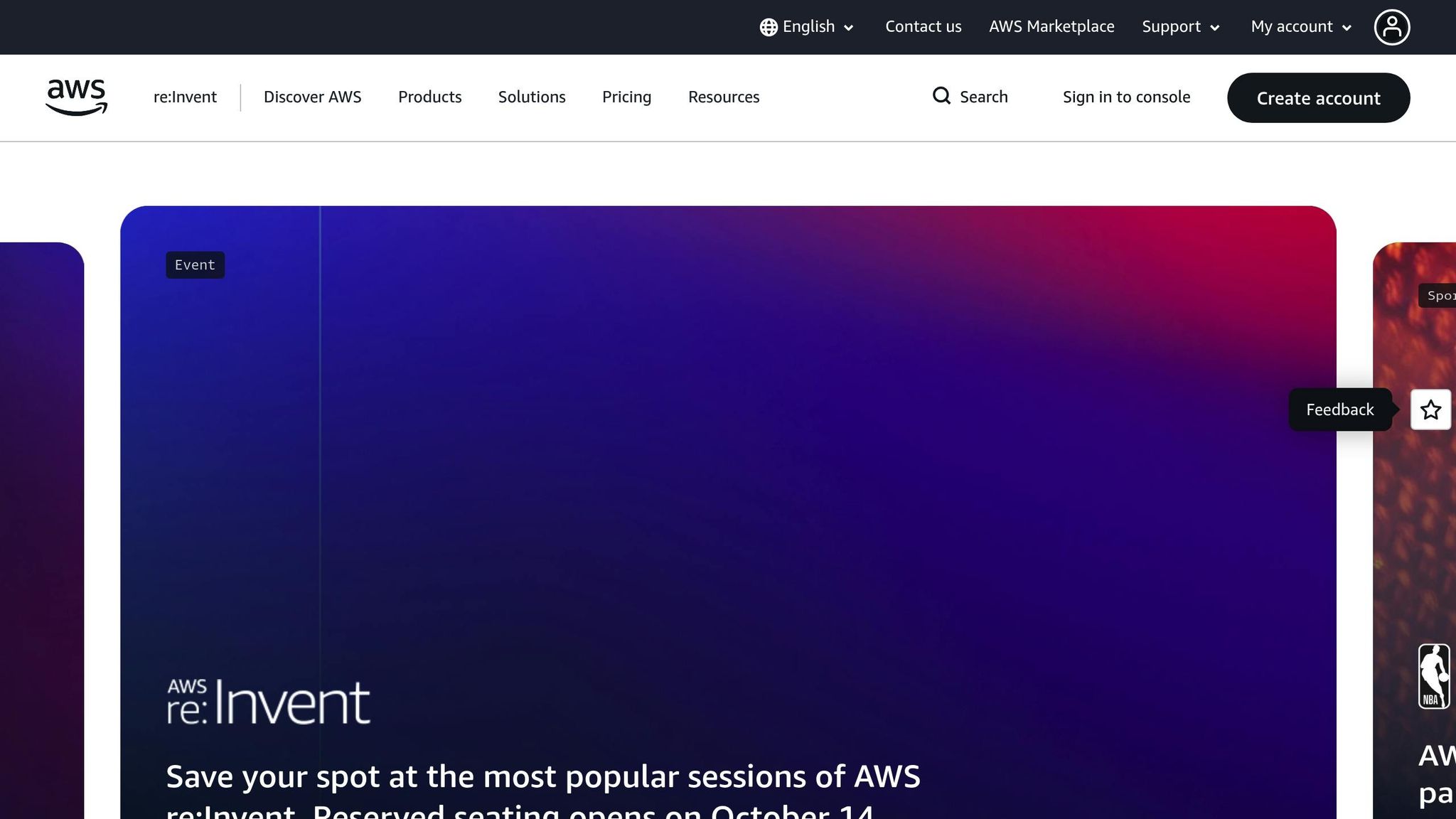
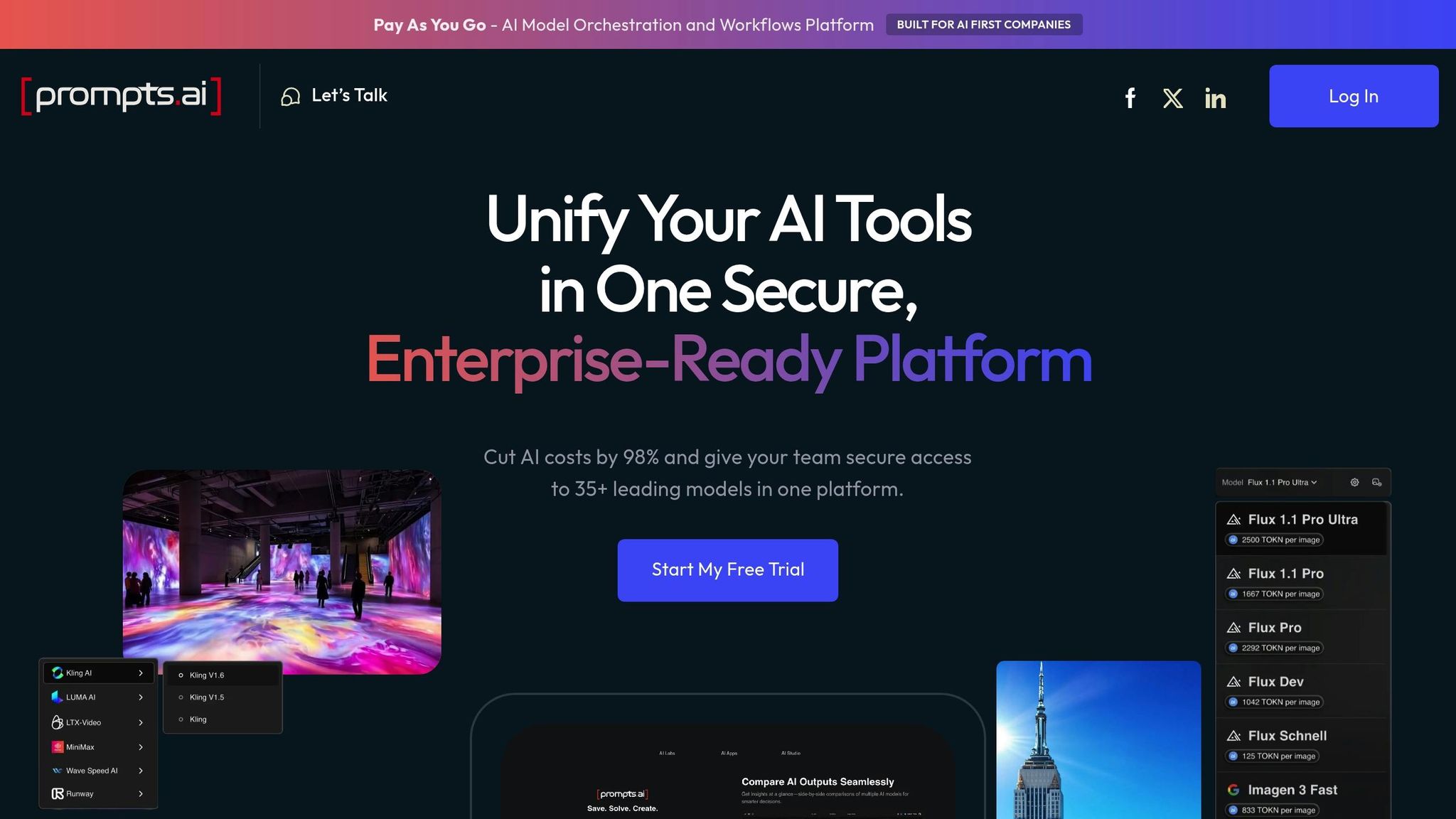
Prompts.ai is a powerful AI orchestration platform designed for enterprise use, bringing together over 35 leading large language models (LLMs) - including GPT-5, Claude, LLaMA, and Gemini - into a unified, secure interface. Built for Fortune 500 companies, creative agencies, and research labs, it simplifies the complexities of fragmented AI systems. By turning scattered experimentation into structured, compliant workflows, Prompts.ai helps organizations reduce costs and streamline governance. These core advantages are further enhanced by its technical capabilities.
Prompts.ai enables seamless transitions between LLM providers, offering APIs and connectors that integrate directly with CRMs, content management systems, and workflow tools. This flexibility allows teams to use OpenAI models for specific tasks, switch to Anthropic's Claude for others, or experiment with open-source options - all within a single platform. With side-by-side performance comparisons, users can assess model effectiveness in real-time, ensuring they choose the best AI solution for each task or workflow.
The platform offers detailed real-time analytics that break down spending by prompt, team, and model. Organizations receive monthly usage reports in U.S. dollars, along with customizable spending alerts to prevent budget overruns. Its FinOps layer tracks every token used, linking AI expenses directly to business outcomes. The Pay-As-You-Go TOKN credits system ensures costs align with actual usage, avoiding the need for fixed monthly commitments and providing better control over budgeting.
Prompts.ai is equipped with robust governance tools, including role-based access controls, detailed audit logs, and data residency options to meet GDPR and CCPA requirements. As of June 19, 2025, the platform’s SOC 2 Type 2 audit process and continuous Vanta monitoring deliver real-time security insights via its Trust Center. Features like model output monitoring, content filtering, and customizable approval workflows further promote responsible AI usage.
Designed for large-scale operations, Prompts.ai supports high-volume API requests and multi-tenant deployments with auto-scaling cloud infrastructure and reliable uptime SLAs. It integrates with identity providers through SSO and SAML, ensuring secure and efficient access. Teams can also use collaborative prompt management and version control to maintain prompt libraries with full audit trails, ensuring compliance and streamlined collaboration.
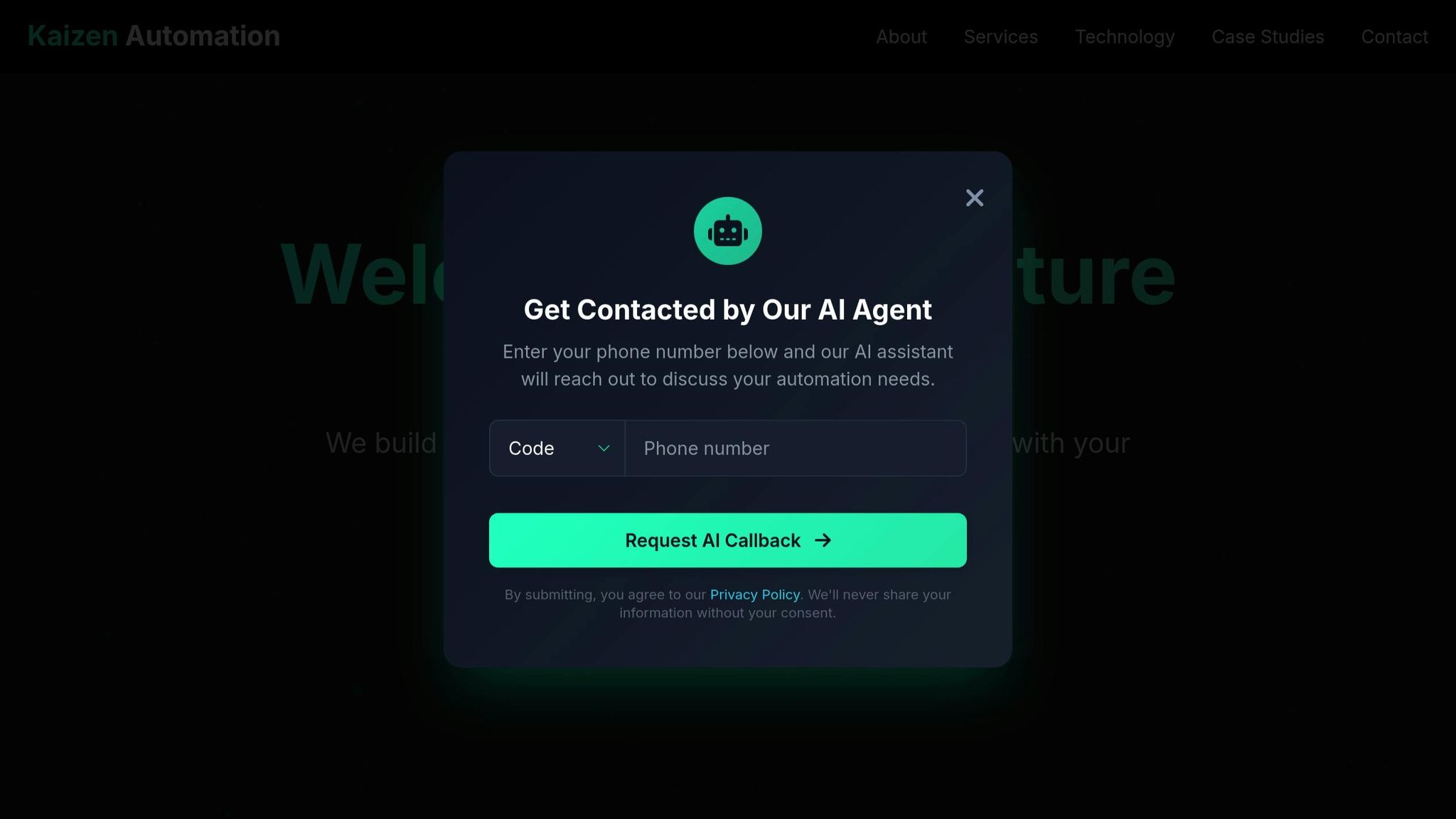
As regulations around generative AI continue to tighten, ensuring compliance is more important than ever. Kaizen Automation is designed to meet these demands, offering a range of governance and compliance tools that provide a secure, regulation-ready framework.
Kaizen Automation prioritizes data security and regulatory adherence. The platform is HIPAA-compliant, employs enterprise-grade encryption for both data transmission and storage, and is actively working toward achieving SOC 2 compliance. Additionally, it ensures that user data is never used to train its AI models.
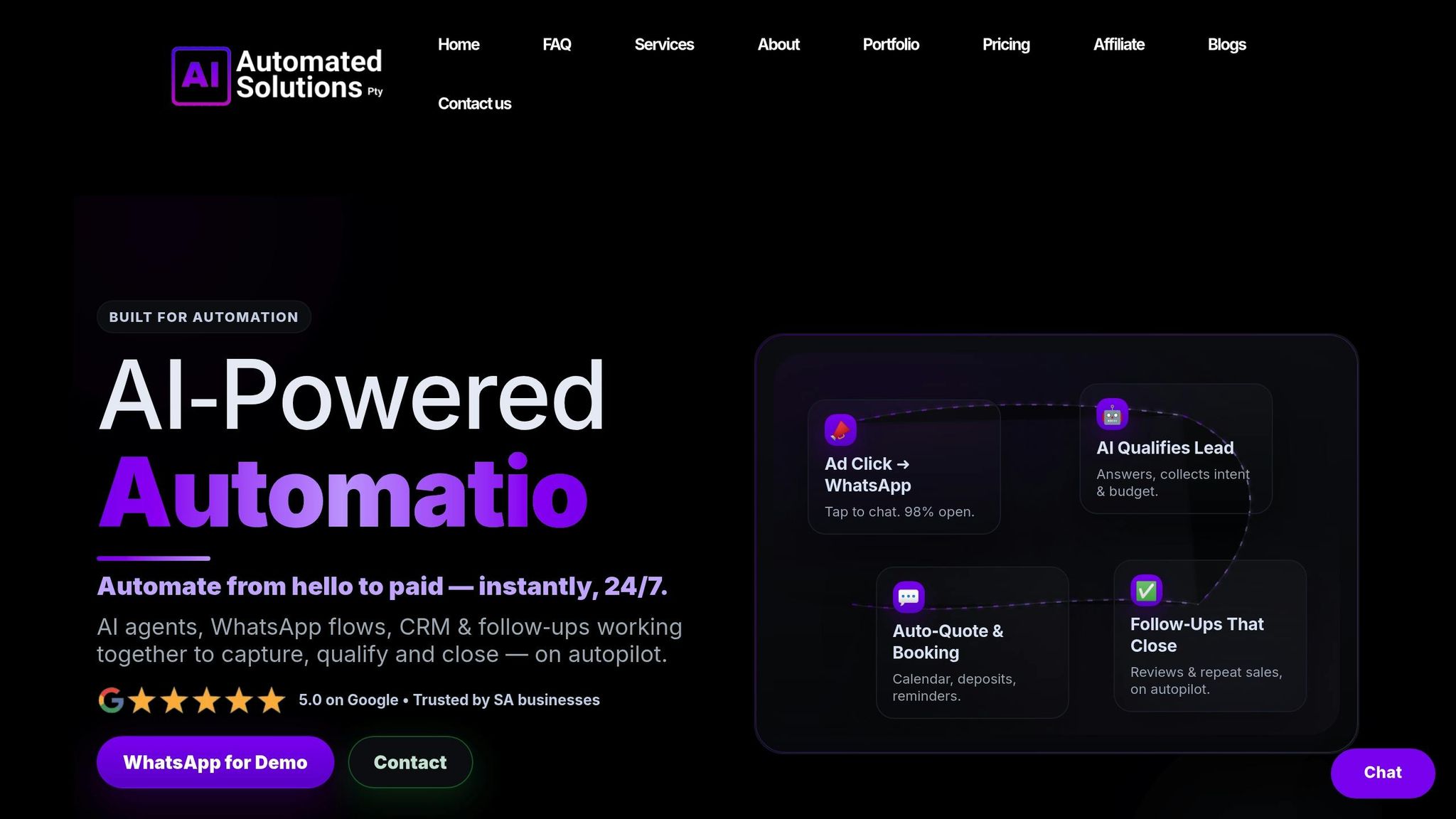
AI Automated Solutions is a generative AI startup focused on addressing enterprise-specific needs. While detailed information about its technical capabilities and integrations remains scarce, the company's emergence underscores the growing trend of businesses leveraging generative AI to simplify workflows and minimize operational challenges. More insights into its strategies and offerings are expected in the future.
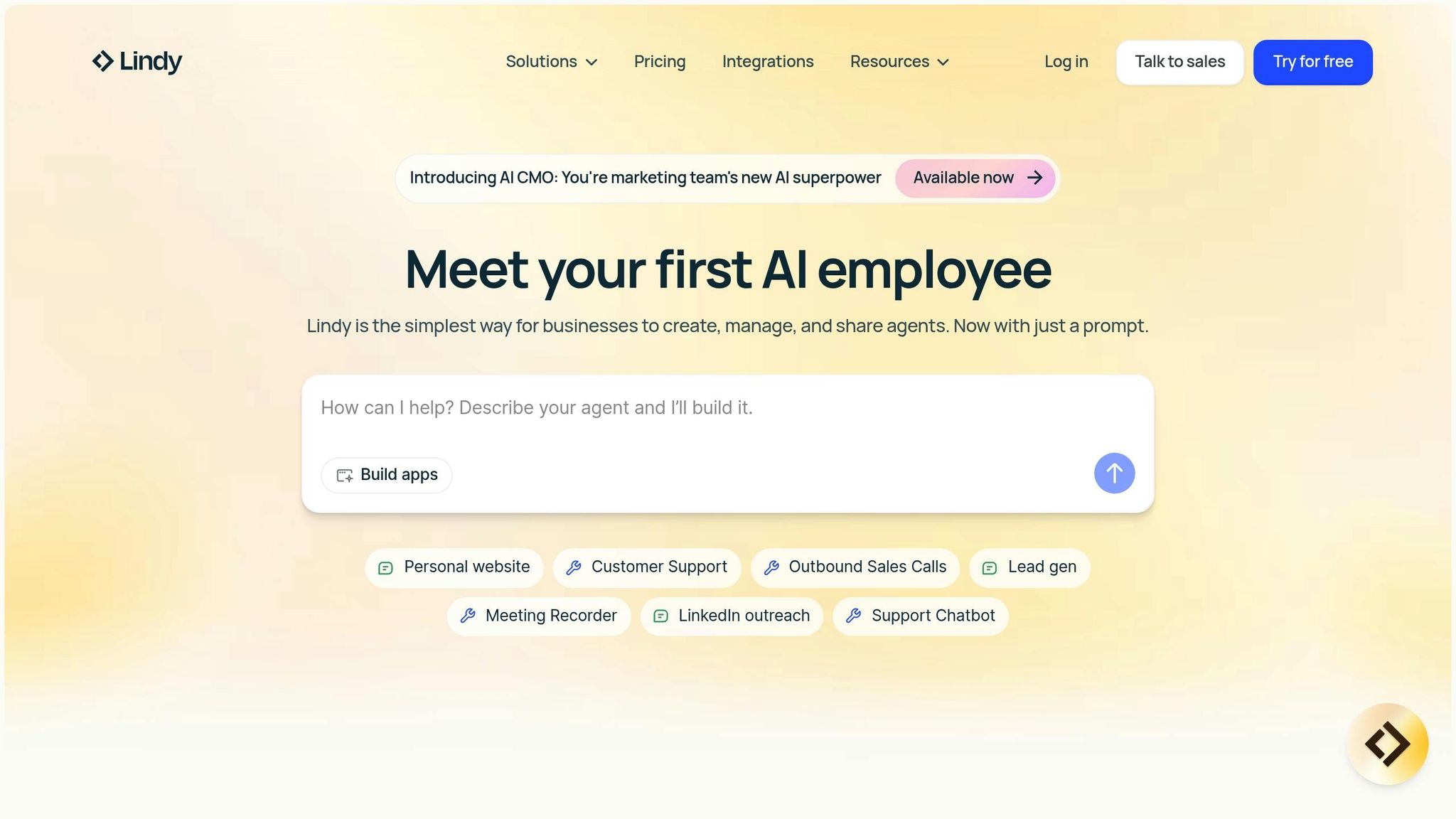
Lindy.ai is a platform designed to bring collaborative AI into business operations, enabling multiple AI agents to work together seamlessly. By focusing on complex workflows, it appeals to enterprises looking to scale their operations beyond basic automation.
"Lindy allowed us to scale the unscalable." – Scot Westwater, CEO, Pragmatic
Lindy.ai stands out with its model-agnostic approach, giving businesses the freedom to use a variety of top AI models without being tied to one provider. It supports hundreds of integrations with widely used business tools, ensuring AI can be embedded into existing workflows without disruption. The platform’s Knowledge Base, which syncs with data from tools like Google Drive and Notion, keeps AI agents informed and up-to-date. This seamless integration forms the backbone of its ability to handle enterprise-level demands efficiently.
Built for large-scale use, Lindy.ai offers features like Team Accounts for secure collaboration across departments and Multi-Agent Systems that can manage specialized tasks. As Ken Aseme, CEO of VC CFO, describes it:
"It's like hiring a 24/7 ops teammate who never misses a deadline."
The platform also includes a Looping feature, allowing AI agents to process large datasets repeatedly, and supports operations in over 50 languages, making it suitable for global enterprises.
Lindy.ai is equipped with comprehensive compliance tools to meet industry-specific regulations. It adheres to SOC 2 standards, which focus on security, availability, processing integrity, confidentiality, and privacy. Additionally, it complies with GDPR, HIPAA, and PIPEDA, ensuring data protection across European, healthcare, and Canadian frameworks. Security is further reinforced with AES-256 encryption for data both at rest and in transit. To demonstrate its commitment to transparency, Lindy.ai provides a dedicated Trust Center highlighting its security and compliance measures.
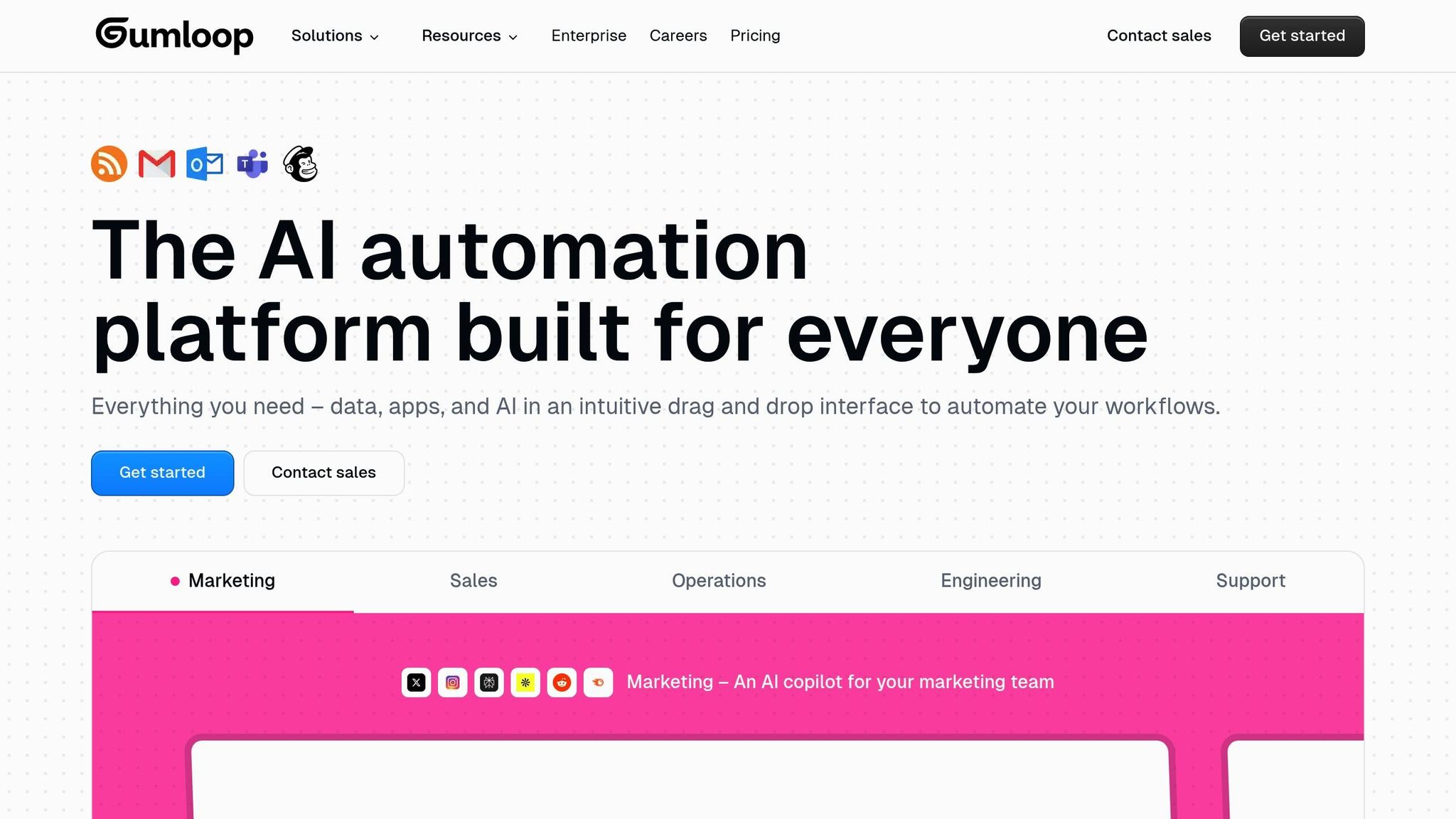
Gumloop redefines AI automation with its user-friendly drag-and-drop interface, allowing even non-technical teams to design and manage complex workflows. Its growing popularity among major enterprises is highlighted by Instacart's CEO, Fidji Simo, who shared:
"Gumloop has been critical in helping all teams at Instacart - including those without technical skills - adopt AI and automate their workflows, which has greatly improved our operational efficiency." – Fidji Simo, CEO, Instacart
Gumloop's simplicity is matched by its advanced capabilities in integrating AI models. The platform supports a wide range of leading AI models, such as OpenAI's GPT series, Anthropic's Claude, Google's Gemini, Perplexity, LLaMA 3, Grok, and DeepSeek. Its AI Router feature ensures optimal performance by automatically selecting the best model for each task.
In addition to model support, Gumloop offers over 110 native nodes for various applications and allows users to create custom nodes tailored to specific databases. Organizations can further streamline operations by integrating their existing AI subscriptions via API keys, cutting down on credit expenses and simplifying billing management.
Gumloop stays ahead of the curve by incorporating new AI models within just one day of their public release.
Designed with enterprises in mind, Gumloop combines scalability with robust governance features. Its AI Model Access Control and custom proxy routing ensure secure and compliant integration for large-scale deployments.
To complement its streamlined integration library, Gumloop introduces "Gummie", an AI assistant capable of creating custom integrations on demand. This feature enhances the platform’s flexibility, catering to unique business needs with ease.
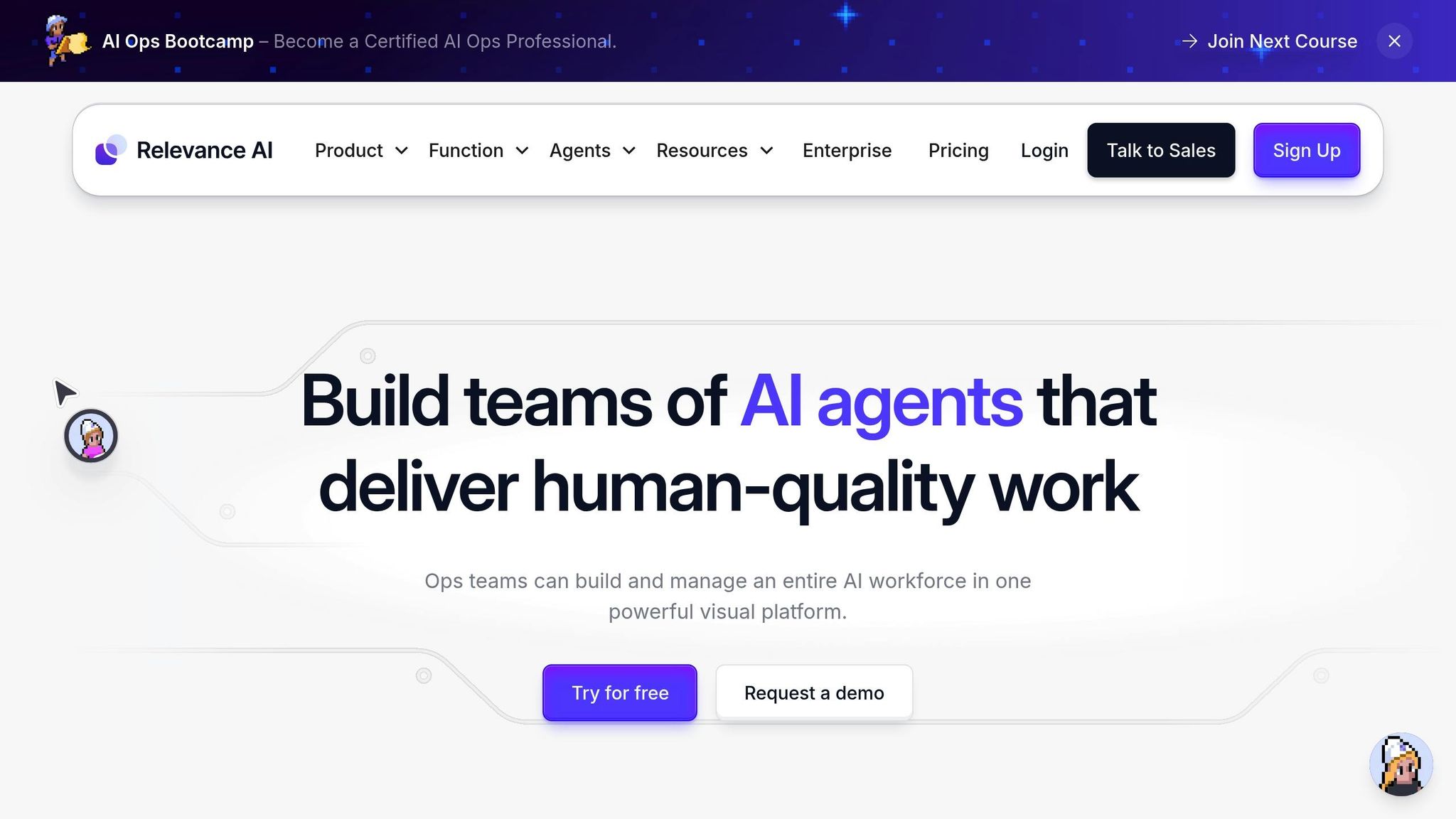
Relevance AI is making waves in the generative AI landscape by offering solutions designed to simplify workflows and enhance enterprise productivity. The platform focuses on developing intelligent AI agents capable of managing intricate business operations, including customer service automation, data analysis, and content creation. By prioritizing real-world applications that deliver measurable returns, Relevance AI has established itself as a trusted ally for organizations aiming to adopt AI without requiring extensive technical expertise.
Relevance AI seamlessly integrates with widely used business tools and platforms, allowing companies to embed AI directly into their existing systems. Supporting multiple AI models, the platform provides adaptable APIs that connect to CRMs, databases, and communication tools. This integration ensures businesses can harness AI's potential without overhauling their current processes, while also offering the scalability to grow alongside evolving operational demands.
Relevance AI stands out for its ability to craft advanced automation workflows capable of managing multi-step tasks with minimal human involvement. Its agent-based framework enables businesses to deploy specialized AI agents for tasks such as lead qualification, customer support, document handling, and data extraction. Operating around the clock, these AI agents deliver consistent performance and maintain high-quality standards, ensuring reliability across all interactions.
With these capabilities, Relevance AI continues to solidify its position as a leader in the growing field of generative AI.
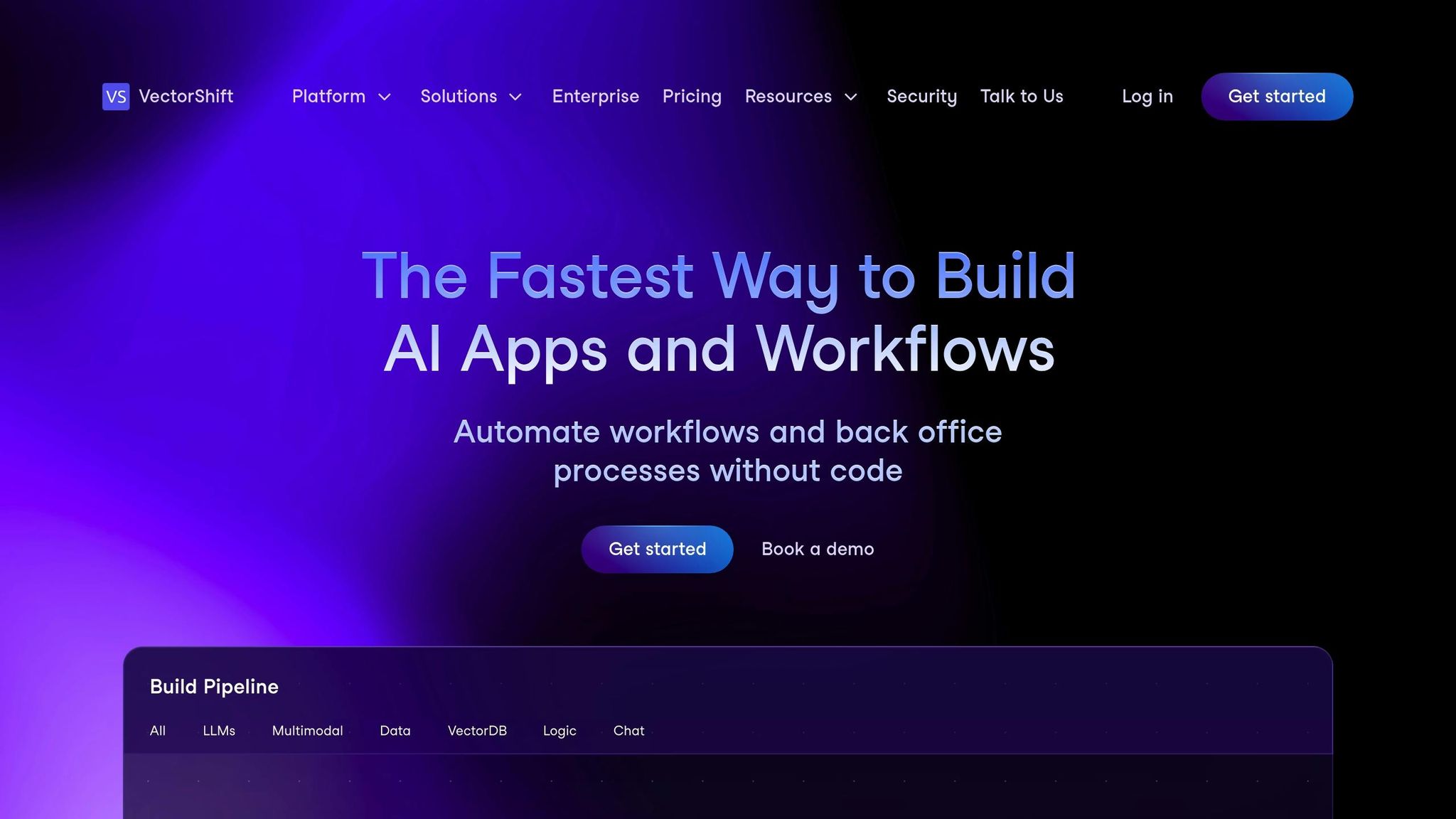
VectorShift has quickly carved out a prominent place in the generative AI space, offering enterprise-focused solutions that prioritize security, compliance, and scalability. Designed for large-scale deployment, the platform enables organizations to harness generative AI capabilities without sacrificing regulatory adherence or data protection standards.
VectorShift sets itself apart with a robust compliance framework that aligns with top-tier industry standards. The platform is certified SOC 2 Type II, HIPAA, and GDPR compliant, showcasing its commitment to safeguarding enterprise data. User data is never utilized for model training, a policy reinforced through formal data agreements. To ensure maximum security, the platform employs AES-256 encryption and TLS 1.3, while strict access controls limit sensitive data access to authorized personnel only. Additional measures, including regular audits, penetration testing, incident response protocols, and security training, further enhance its proactive approach to data protection.
Beyond its stringent security measures, VectorShift is built to scale effortlessly for enterprise operations. It incorporates LLM guardrails that enforce content policies and regulatory compliance, ensuring generative AI applications remain aligned with organizational and legal standards. The platform’s built-in PII protection automatically filters out sensitive personal information, preserving user privacy. Role-based access controls allow businesses to define and manage user permissions with precision.
A notable example of VectorShift’s capabilities occurred in March 2025, when a financial institution leveraged the platform to streamline its Know Your Customer (KYC) processes. Using an automated workflow, a Gmail trigger initiated document processing, nodes extracted and summarized customer data into JSON format, and an API node updated databases. This approach significantly reduced both costs and errors, demonstrating the platform’s practical impact.
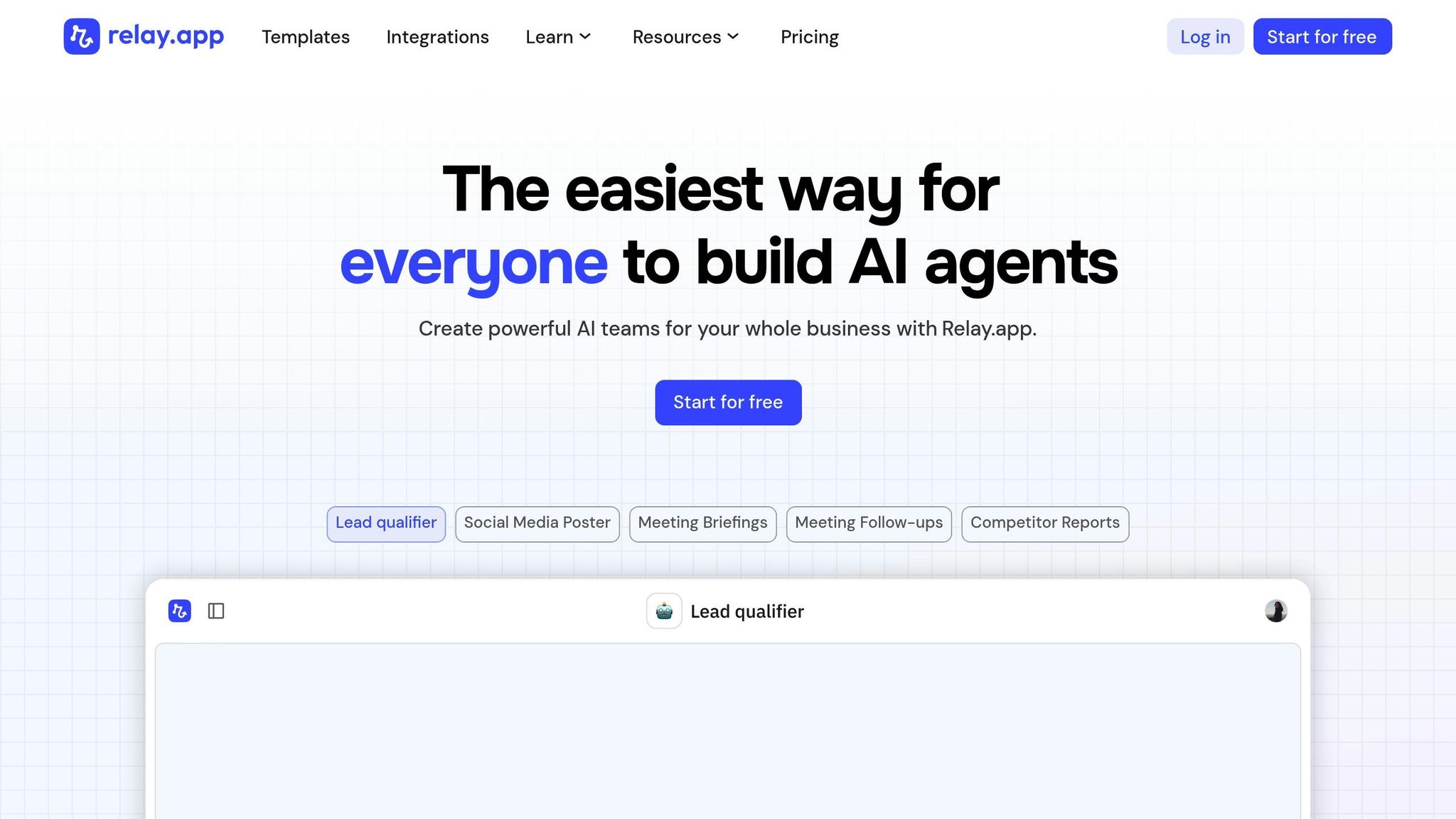
Relay.app stands out in the realm of generative AI automation by combining advanced AI capabilities with human oversight to ensure quality and compliance. It addresses the challenges of enterprise automation by maintaining high standards of quality control and regulatory adherence. Below, we explore how Relay.app’s integration, compliance, and scalability features empower enterprise workflows.
Relay.app simplifies the process of connecting various AI models to essential business tools. With built-in features for tasks like summarization, translation, and data extraction, the platform also allows users to craft custom prompts for tailored needs. Supporting over 100 app integrations - including OpenAI - Relay.app enables seamless collaboration between AI models and widely-used tools like Google Sheets, Notion, Salesforce, and Slack.
The platform's flexibility extends to designing intricate AI agents. Features like paths and iterators allow users to link multiple integrations into cohesive, multi-step workflows.
"I wanted to send newsletters from Outlook to Notion, and it was so easy I almost cried - after struggling and giving up with other tools like Make." - Salama, @SalamaErgossum
A practical example of this integration is Lucas Grey’s automation of his company’s waitlist collection and response process. By using GPT to parse email replies and automatically save the data into a Notion database, Lucas streamlined what was once a time-consuming task. Relay.app enables businesses to unify diverse AI tools into efficient, enterprise-grade workflows.
Relay.app prioritizes enterprise security and compliance, offering SOC 2 certification and clear protocols for information security, including transparent disclosures for Google API usage. The platform integrates checkpoints like approval steps, manual tasks, and data entry to ensure AI-generated outputs undergo human review, meeting stringent regulatory standards.
"Relay's 'human in the loop' model is super effective for teams. Not only is this the best designed UI for automation building on the market, they've really thought about how not everything can be automated. Fantastic for building operationalized SOPs." - Benjamin Borowski, @typeoneerror
This focus on governance ensures that businesses can confidently deploy AI solutions without compromising on compliance or oversight.
Relay.app’s design supports effortless scalability, making it a valuable tool for large teams and enterprise-level operations. The platform allows businesses to build robust AI-powered teams while maintaining quality control and adherence to established Standard Operating Procedures (SOPs).
Its extensive integration ecosystem ensures smooth data flow across enterprise systems, while advanced workflow features handle the complexities of large-scale automation. Unlike tools that force businesses to adapt their processes, Relay.app aligns with existing workflows, offering flexibility and ease of adoption.
"Relay is the only tool we've used that conforms to our processes, rather than having to adjust the process to conform to the tool. It truly is the only tool we've used that feels frictionless for human-in-the-loop workflows." - Hassaan Raza, Co-Founder & CEO, Tavus
Relay.app’s ability to integrate seamlessly, maintain compliance, and scale effectively makes it a trusted choice for enterprises seeking streamlined AI solutions.
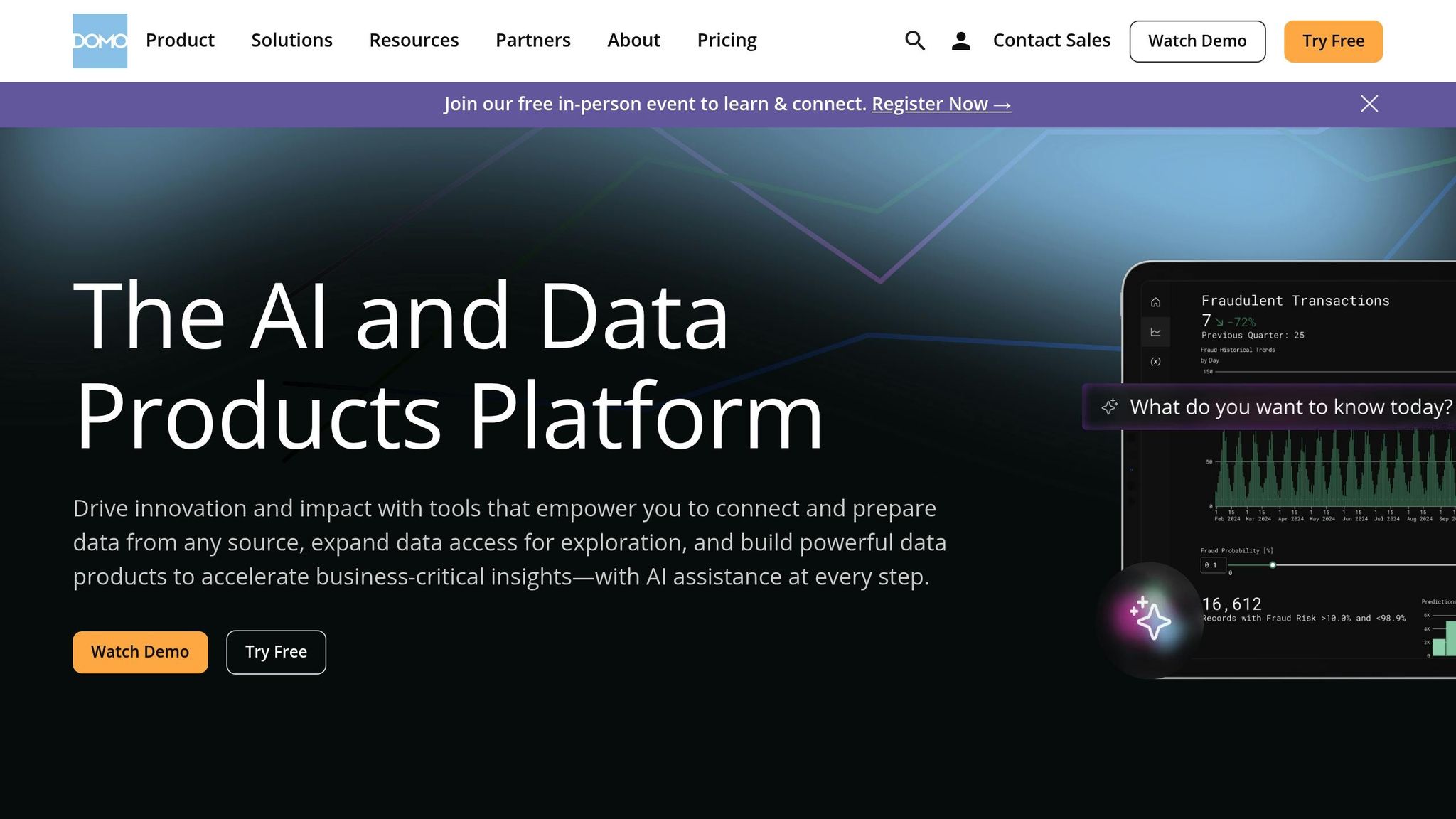
Domo's business intelligence platform leverages generative AI to simplify and enhance data management and analysis. It brings together data from multiple sources, provides tools for transforming that data, and ensures centralized oversight to maintain secure and scalable operations. By integrating generative AI, Domo not only enhances the way businesses handle analytics but also strengthens seamless, AI-powered workflows. This strategy sets the stage for developing even more advanced platforms for orchestrating workflows.
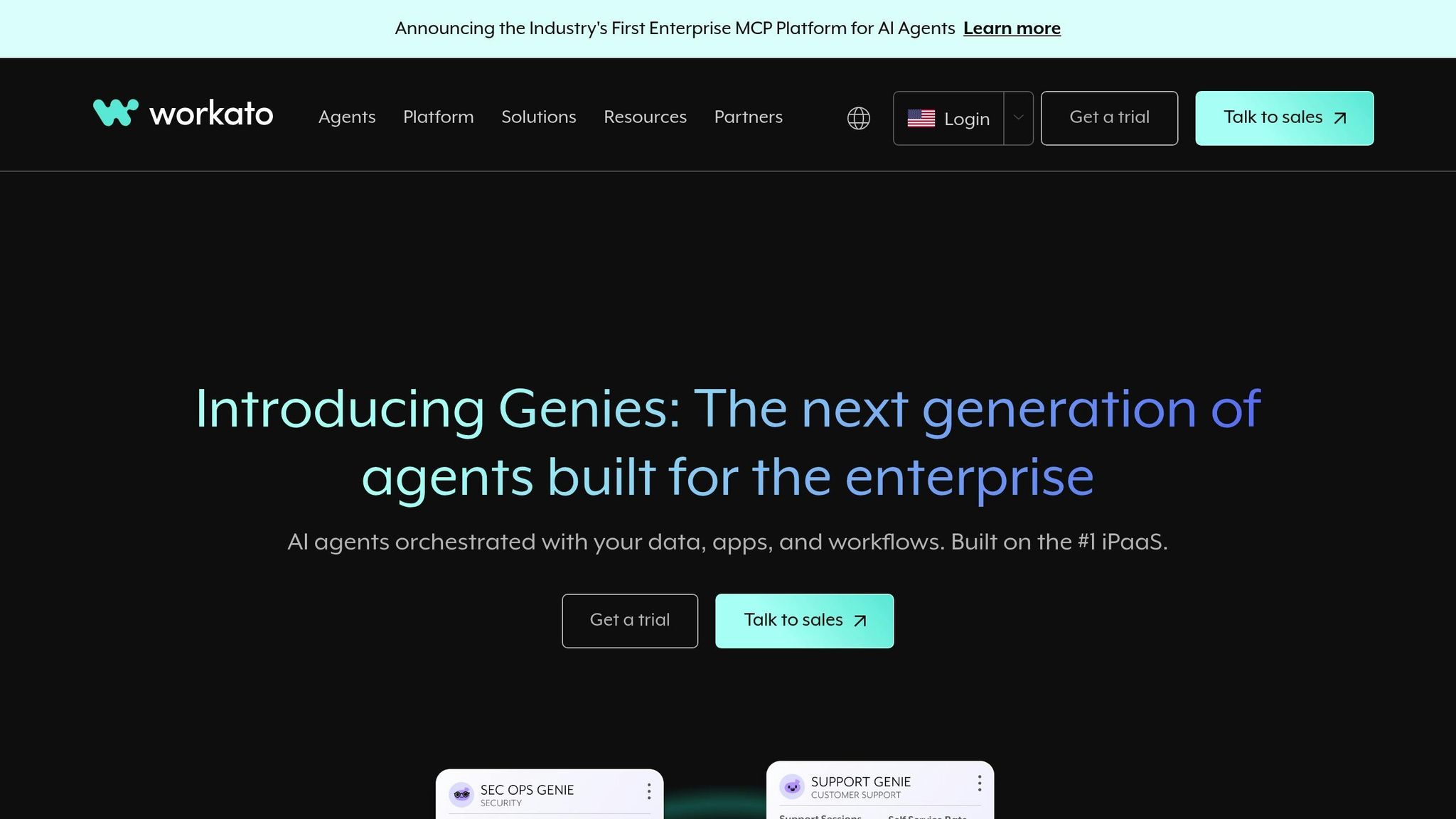
Workato stands out as a leader in centralized AI workflow management, offering enterprises a powerful platform to automate processes with ease. By integrating generative AI, Workato connects applications, data, and processes, simplifying complex workflows and making automation accessible to all business users.
Workato supports over 1,000 applications, including popular tools like Salesforce, ServiceNow, and Microsoft Office 365. Through its pre-built connectors and custom integrations via the Recipe Development Kit, the platform allows businesses to tailor solutions to their unique needs. This is especially beneficial for companies working with proprietary AI models or industry-specific applications requiring specialized data handling.
The platform’s ability to integrate with cloud-based AI services ensures smooth operations while adhering to strict data security and compliance standards. This connectivity forms a strong foundation for governance and control.
Workato goes beyond integration by embedding robust governance and compliance measures into its workflows. The platform provides detailed audit trails and role-based access controls, enabling teams to collaborate securely while safeguarding sensitive data and workflows from unauthorized access.
Its compliance framework aligns with major regulations such as GDPR, HIPAA, and SOX. Additionally, Workato holds certifications like SOC 2 Type II and ISO 27001, giving businesses the confidence to handle critical processes and customer data securely.
Built on a cloud-native architecture, Workato can handle millions of transactions daily, automatically scaling resources to meet demand during peak periods. This ensures consistent performance without the need for manual adjustments.
Workato’s enterprise readiness goes beyond technology. The platform offers extensive support services, including dedicated customer success teams, comprehensive documentation, and training programs. These resources empower organizations to make the most of their automation efforts, accelerating their return on investment and achieving faster results.
Unified orchestration plays a vital role in evaluating generative AI startups. Below is a table that outlines key operational aspects such as model interoperability, cost management, governance, scalability, and community engagement. While Prompts.ai and VectorShift provide detailed information, other platforms have not disclosed their metrics. Use this overview as a starting point for assessing these platforms.
| Platform | Model Interoperability | Cost Transparency | Governance & Compliance | Scalability | Community Support | Pricing Structure |
|---|---|---|---|---|---|---|
| Prompts.ai | Over 35 leading LLMs, including GPT-5, Claude, LLaMA, and Gemini | Real-time FinOps tracking to cut costs by up to 98% | Enterprise-grade audit trails with role-based access | Built for enterprise-scale workloads | Prompt Engineer Certification and active community | Pay-as-you-go TOKN credits; Business plans from $99–$129 per member/month |
| Kaizen Automation | - | - | - | - | - | - |
| Ai Automated Solutions | - | - | - | - | - | - |
| Lindy.ai | - | - | - | - | - | - |
| Gumloop | - | - | - | - | - | - |
| Relevance AI | - | - | - | - | - | - |
| VectorShift | Drag-and-drop model integration with no-code and SDK options | - | - | Engineered for flexible scalability | Robust developer tools and active community | - |
| Relay.app | - | - | - | - | - | - |
| Domo | - | - | - | - | - | - |
| Workato | - | - | - | - | - | - |
For a deeper understanding of each platform’s capabilities, it’s recommended to reach out to providers directly. This approach ensures that organizations can gather specific details tailored to their enterprise needs and priorities.
The generative AI startup scene is reshaping how American businesses approach content creation and streamline workflows. These companies are evolving past basic AI tools, delivering comprehensive platforms designed to tackle real-world business needs.
One standout in this space is Prompts.ai, which has set new standards with features like unified access to leading AI models, advanced security protocols, and real-time cost controls - helping businesses cut AI expenses by as much as 98%.
The U.S. AI market, projected to grow from $173.56 billion in 2025 to a staggering $851.46 billion by 2034, reflects the immense potential of these innovations. This growth aligns with increasing demand for secure and compliant AI solutions, a critical requirement for enterprises today.
Governance and compliance remain at the heart of these platforms' success. For instance, Arthur AI's introduction of the first-ever LLM firewall showcases how startups are addressing concerns about AI safety and regulatory compliance. This emphasis on responsible AI practices is accelerating adoption, particularly in industries managing sensitive data.
Generative AI platforms are also delivering measurable results, cutting workflow production times by as much as 70% and operational costs by 40% through intelligent automation and flexible pricing models. Solutions like Prompts.ai’s TOKN credit system exemplify this approach, allowing businesses to pay based on actual usage rather than committing to rigid subscriptions. This not only reduces costs but also aligns spending directly with business outcomes.
As these platforms continue to evolve, they are enabling enterprises to deploy secure, scalable AI solutions in minutes instead of months. By combining unified model access, transparent pricing, and robust security measures, American businesses are well-positioned to lead the global AI revolution while meeting the high standards of governance and compliance their customers expect.
The future belongs to organizations that embrace generative AI while prioritizing security, compliance, and cost-effectiveness. These startups are making that vision a reality, empowering businesses across the U.S. to innovate and thrive in the AI-driven era.
Generative AI startups are reshaping how businesses operate by cutting costs and simplifying workflows. They achieve this by automating repetitive tasks, reducing reliance on large technical teams, and optimizing processes. The result? Streamlined operations, improved efficiency, and noticeable savings.
In addition to enhancing productivity, these startups place a strong emphasis on security and compliance. Their solutions come equipped with built-in protections to safeguard sensitive data and adhere to industry-specific regulations. This focus on security ensures that businesses can confidently adopt AI technologies without compromising trust or compliance standards.
Fragmented AI tools often create hurdles for businesses, especially when they don’t integrate well with existing workflows. This lack of cohesion can slow down projects and limit the potential benefits of AI, making it difficult to streamline operations or tap into the full power of these technologies.
To tackle these issues, startups are stepping in with customized solutions designed to address specific challenges. By focusing on compatibility with current workflows and providing intuitive, easy-to-use tools, they enable businesses to cut through inefficiencies and get the most out of their AI investments.
Model interoperability plays a key role in enabling generative AI platforms to work effortlessly with a wide range of tools, systems, and workflows that businesses rely on. This capability empowers organizations to utilize various AI models and technologies without being tied to a single vendor, offering more flexibility and room to grow.
For businesses, interoperability streamlines the implementation of AI solutions across different applications - whether it's creating content or automating routine tasks. It also helps cut expenses and boosts efficiency by facilitating smoother data sharing and system compatibility. In essence, it ensures generative AI platforms remain adaptable to changing business demands while delivering optimal value.


